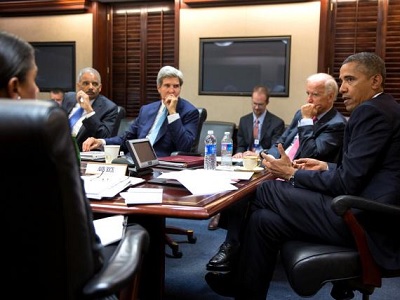
By Binoy Kampmark
Historical analogies can be effective tools to command attention. They can also be grotesque fabrications and dangerous distortions. Each historical event has its own locale of development, its own forces, and distinctiveness. Analogy, for that reasons, can only be suggestive, never conclusive.
The Munich Analogy is one such object of abuse. In 1938, Czechoslovakia was effectively surrendered to Nazi Germany by agreement at Munich, part of Western Europe’s appeasement strategy in the wake of a rampant Adolf Hitler. This was a crude version of land for peace – give the land to Nazi Germany, and keep the peace in Europe. Europe was still war stricken by the First World War. The episode has been much misunderstood, and often such misunderstandings become the basis of analogies.
This awareness is not evident in such individuals as U.S. Secretary of State John Kerry, who has leapt at the analogy at the galvanizing moment. He wants war. The Obama administration wants war. Syria is the object. “This is our Munich moment. This is our chance to join together and pursue accountability over appeasement.” The highlighted terms: appeasement. The notable omission: consequence, other than selective allusions to how international law might be affected.
Kerry suggests that to not intervene would be worse than doing so. He uses the imagery of the cartoon gangster, coupled with historical bad men who are animated by similar traits. After all, he has compared Syria’s Bashar al-Assad with Saddam Hussein and Adolf Hitler, suggesting that three is not a crowd in the manner chemical weapons were used.
He does not give a sense about what that would mean for the UN system, presumably on the premise that the policeman’s self-appointed duties must be discharged, and that they do not lie in the remit of the Security Council. Furthermore, Chapter VII of the Charter, one that gives the Security Council the authority to conduct such interventions, is a dead letter when it comes to the occasional humanitarian apoplexy the U.S.-led political establishment feels. At the heart of many a vigilante is the desire to be noble. Besides, that vigilante’s citizens won’t suffer too much – there will be no “boots on the ground”.
If that responsibility does even exist, it must be, according to this argument, necessarily subverted in the face of violations of ius cogens rules of law. We have the dangerous circularity of the argument. Law, to be protected, must be flouted in order to be preserved. Its violation insures its preservation. Order demands a degree of disturbing disorder, a maladjusted response. Michael Cohen, Century Foundation fellow, argues that “for such laws and norms to have any validity they occasionally need to be enforced” (The Guardian, Aug 30).
The imagery being used here is vital. Obama speaks of World War II and the creation of the United Nations in the context of those “ashes of the world war” from which “we built an international order and enforced the rules that give it meaning”. Obama then poses the question: “If we don’t enforce accountability in the face of this heinous act, what does that say about our resolve to stand up to others who flout fundamental international rules?”
In actual fact, such enforceable action after the great conflict was arbitrary and capricious, and those who flouted rules, be it the bevy of vicious Latin American dictatorships, or the necessary middle eastern despots who were backed by U.S. chequebooks, demonstrated that much flouting took place without incident. Ditto those in the Soviet system of client states and satellites, or African regimes where murder was practiced as state policy. The UN system is, in fact, a carefully managed system of tolerated “flouting” of conventions, punctuated by murderous exceptions.
To the analogy argument, each good one deserves another, and the game of historical ping pong can take place. Iraq and chimerical weapons of mass destruction is one such case, where the deception assumes the level of orthodoxy in a regime. It is easy to practice. It is easy to endorse. Besides, it is moral, high minded, and to some, even generous. And, if the greater historical library be your reference, the Gulf of Tonkin incident (1964) might be of some value, an incident that also involved distorted evidence suggesting North Vietnamese aggression. Both cases involved deceptions affected to force aggression. Both were fabrications.
The ensuing carnage that will follow from intervention in Syria may not be initially seen, but it will ensue. The international community is already fractured with regards the Sunni-Shia bloodbath, with various sides, actual or clandestine, taken on the Syrian conflict. The Russian position, as articulated by President Vladimir Putin at the G20 summit, is one of skepticism towards those who initiated the chemical attacks.
True, his critics might suggest that he is being disingenuous, but the rebel forces remain so disunited suggestions that the attacks might have come from their side and initiated against another opposition group are not extra terrestrially far-fetched. Add to this the fact that Sarin gas is easily manufactured, and we have a mess than can only get messier, whatever the noble trigger-happy lobbyists in Washington might feel.
The Obama administration has already made regime change a priority, though it prefers to use other terms such as a surgical attack that will “degrade” the Assad regime’s defenses. (Degradation need not be change, except when it means change.) It doesn’t want to give the Chinese and the Russians a sense that it is in the business of toppling regimes on executive fiat. Naturally, they don’t trust that sentiment. Nor should we.
– Binoy Kampmark was a Commonwealth Scholar at Selwyn College, Cambridge. He lectures at RMIT University, Melbourne. He contributed this article to PalestineChronicle.com. Contact him at: bkampmark@gmail.com.




